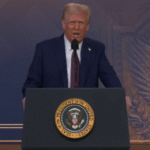Washington, D.C. – Boeing is on the verge of sidestepping a criminal trial and guilty plea in a fraud case tied to the 2018 and 2019 737 Max crashes that killed 346 people, according to sources familiar with the matter. The U.S. Department of Justice (DOJ) has proposed a tentative nonprosecution agreement, which would allow the aerospace giant to avoid a felony conviction for misleading regulators about a critical flight control system. The deal, reported by Reuters and NBC News, has drawn fierce criticism from victims’ families, who accuse the DOJ of letting Boeing off too lightly for what a federal judge once called “the deadliest corporate crime in U.S. history.”
The crashes—Lion Air Flight 610 in Indonesia in October 2018 and Ethiopian Airlines Flight 302 in March 2019—stemmed from flaws in the 737 Max’s Maneuvering Characteristics Augmentation System (MCAS), which Boeing failed to fully disclose to the Federal Aviation Administration (FAA). In 2021, Boeing secured a deferred prosecution agreement (DPA) with the DOJ, paying $2.5 billion, including a $500 million victims’ fund, to avoid charges. But after a January 2024 Alaska Airlines 737 Max 9 incident, where a door plug blew out mid-flight, the DOJ found Boeing had violated the DPA by failing to implement promised safety and compliance reforms. This led to a July 2024 plea deal where Boeing agreed to plead guilty to a fraud conspiracy charge and pay up to $487.2 million.
That plea was rejected in December 2024 by U.S. District Judge Reed O’Connor in Texas, who criticized a diversity and inclusion clause in the selection of an independent monitor and argued the deal limited his oversight. The rejection, coupled with the transition to the Trump administration, gave Boeing leverage to push for a nonprosecution deal, with prosecutors citing “meaningful downside risk” in going to trial. The proposed agreement includes an additional $444.5 million for the victims’ fund, bringing Boeing’s total payments to nearly $1 billion, but it would spare the company a felony record that could jeopardize government contracts with the Pentagon and NASA.
Families of the victims are livid. During a Friday meeting with DOJ officials, lawyers representing relatives of the 346 deceased called the deal a “backroom bargain” that lets Boeing “buy its way out of accountability.” Paul Cassell, a lawyer for the families, said the DOJ seemed determined to “let Boeing escape any real consequences for its deadly lies.” Erin Applebaum of Kreindler & Kreindler, representing 34 families, added, “This isn’t justice—it’s a scripted outcome that undermines public trust.” Nadia Milleron, who lost her daughter in the Ethiopian crash, questioned how Attorney General Pam Bondi could justify leniency for a “repeat offender.” The families, who have long demanded a public trial, plan to fight the deal in court, arguing it fails to reflect the gravity of Boeing’s actions.
The public reaction has been equally heated. Posts on X captured the outrage, with one user writing, “346 dead, and Boeing might walk? This is why people don’t trust the system.” Another called it “a slap in the face to every victim’s family.” The sentiment reflects broader frustration with corporate accountability, especially after Boeing’s history of safety lapses, including the Alaska Airlines incident that reignited scrutiny.
Boeing’s critics argue the company’s influence as a major defense contractor and employer—supporting over 150,000 U.S. jobs—has softened the DOJ’s stance. A felony conviction could have barred Boeing from federal contracts, though waivers were possible. Supporters of the deal, including some DOJ officials, contend that a trial risks an uncertain outcome and could destabilize a company critical to the U.S. economy and aviation industry. “The goal is to reform Boeing, not destroy it,” said Matthieu Goddeyne, a former prosecutor, emphasizing the balance between justice and economic stability.
The deal’s fate remains uncertain. It requires Judge O’Connor’s approval, and the families’ legal challenge could sway the outcome. If approved, Boeing would avoid a June 23 trial and likely face continued oversight, possibly including an independent monitor. But the absence of a guilty plea raises questions about deterrence. “Without a hefty penalty, there’s no incentive for Boeing to change,” said Erin Applebaum, echoing families’ calls for fines in the billions. The DOJ and Boeing declined to comment, leaving the next steps unclear as negotiations continue.
For now, the case underscores a deeper tension: how to hold a corporate giant accountable for catastrophic failures without crippling a vital industry player. As the families brace for another courtroom fight, the world watches whether Boeing will face the consequences they believe it deserves or slip through with a deal many call too soft for the loss of 346 lives.

















